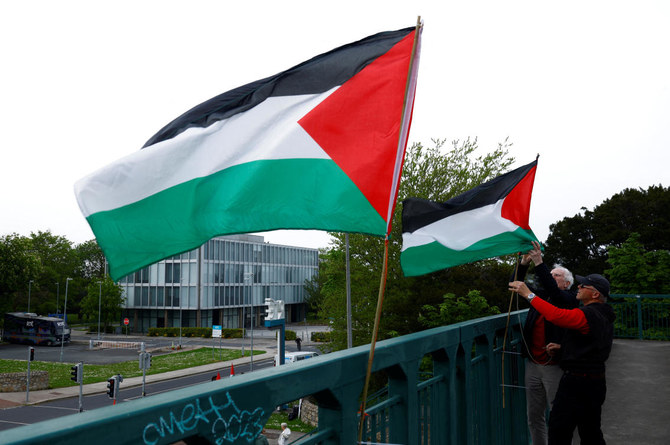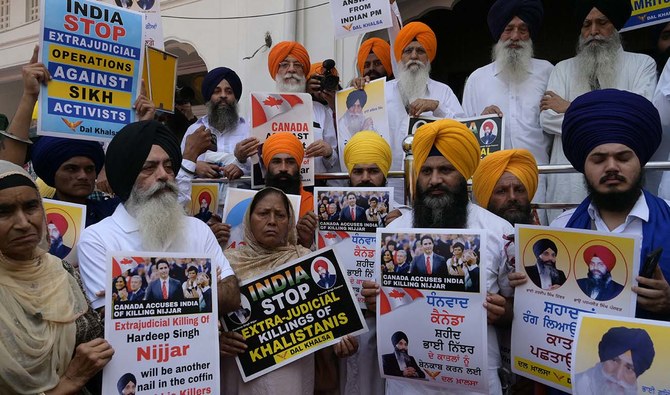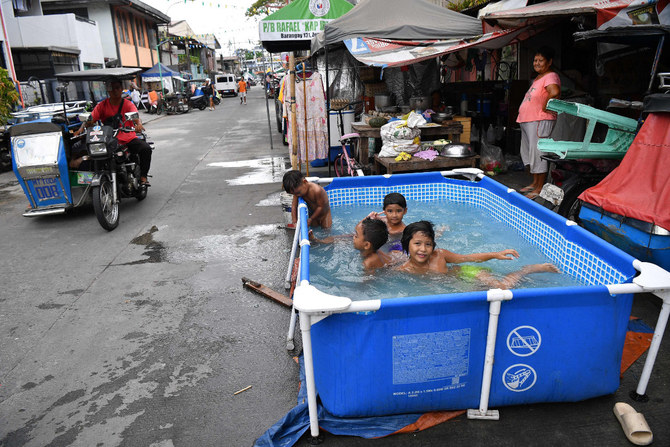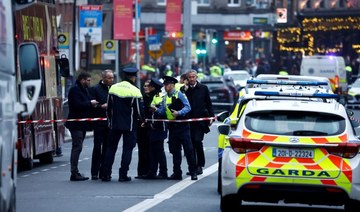NEW YORK: The COVID-19 pandemic has hampered diplomacy and created complications for UN-led peace efforts, Security Council members were told on Monday. Calls for a global ceasefire have been largely ignored, and existing fragilities and inequalities have worsened, experts said.
The health crisis is seen by some as an opportunity to advance on the battlefield, or to shore up oppressive policies, they added. Meanwhile, young people have been particularly badly affected by massive job losses, and women have borne the brunt of a significant increase in levels of domestic violence.
In the four months since the Security Council last met to discuss the effects of the pandemic on peace and security around the world, the situation has deteriorated, said Rosemarie DiCarlo, under-secretary-general for political and peacebuilding affairs.
She reminded council members that more than two million people around the world have died from conditions related to COVID-19, more than 100 million have been infected by the disease, new variants of the virus threaten to trigger severe new waves at a time when health systems in many places are already on the verge of collapse, and the pandemic has cost $3 trillion in lost wages.
“The pandemic has exacerbated inequality and corruption, bred misinformation, stigmatization and hate speech, and created new flashpoints for tension and increased risks of instability,” DiCarlo told council members.
The meeting was called to review progress in the implementation of Security Council Resolution 2532, which was unanimously adopted in July last year in response to an appeal by UN Secretary-General Antonio Guterres for a global ceasefire so that all nations can focus on fighting the virus.
Although many nations expressed public support for his plea, in practice it largely fell on deaf ears. Existing conflicts continued to rage and new ones erupted, such as the war between Armenia and Azerbaijan over the disputed Nagorno-Karabakh region.
However, DiCarlo said the appeal by Guterres had succeeded in adding momentum to floundering peace processes in some countries. She highlighted the situation in Libya as an example of “how sustained political engagement, more unified support from the international community, and commitment by the parties can lead to tangible progress.”
She hailed the signing of the ceasefire agreement in the country last October as a “major achievement,” with the 5+5 Joint Military Commission, which includes five representatives from each of the rival sides in the conflict, working on a monitoring mechanism.
Tunisia holds the presidency of the Security Council this month, and DiCarlo thanked the “government and people of Tunisia” for hosting the Libyan Political Dialogue Forum. She said it represents “a pivotal opportunity” for negotiations and is helping to maintain momentum in the run-up to national elections scheduled for December this year.
“Libya remains at a critical juncture,” she said. “It is imperative that the Libyan parties maintain the momentum towards peace, with the full support of the Security Council.”
Turning to the conflicts in Syria and Yemen, DiCarlo said that the UN’s special envoys will not relent in their pursuit of peace in those countries.
However, now that vaccinations have begun in many countries, raising hopes that this might begin to bring the pandemic under control, she warned that a global recovery could be jeopardized by inequalities, if rich nations continue to buy up and hoard vaccine supplies while the less wealthy go without.
“This would be a catastrophic moral failure (and a) severe blow to peace and security,” DiCarlo said. However she added that “where there is real political will to make and sustain peace, almost no barrier is insurmountable, especially if there is support from the global community.”
Jean-Pierre Lacroix, the under-secretary-general for peace operations, said that COVID-19 has slowed the peace process in South Sudan, further estranged the two communities in Cyprus, and exacerbated the crisis in Lebanon.
He added that the pandemic has shone a light on the important role of women, who are on the front line of the fight against the virus, working to cope with its effects and helping to mitigate the political risks resulting from it.
“The pandemic presents a test of our collective commitment to international peace and security”, said Lacroix. He applauded the efforts of all those involved in peace efforts, and the Security Council’s “strong and steadfast” support for those attempting to overcome challenges in pursuit of peace.
Mark Lowcock, under-secretary-general for humanitarian affairs and emergency relief coordinator, told the council that many poor countries are in the midst of a second, more dangerous, wave of COVID-19 infections.
While it is true that vaccines offer hope of ending the pandemic, Lowcock reiterated that “no one is safe until everyone is safe, and the risk that the most fragile countries are at the end of a long, slow-moving queue for the vaccine imperils us all.”
As the world faces the “worst global economic contraction in 90 years,” he said an estimated “235 million people will need humanitarian assistance and protection, 40 percent more than last year, (an increase that is) almost entirely down to COVID.”
As he warned that humanitarian efforts are being outpaced by the health crisis, Lowcock appealed to council members for $35 billion of funding to enable the humanitarian coordination system to help 160 million people in need.
“The next six months will be crucial,” he said. “Today’s decisions will determine our course for years to come.”
UN urged to address effects of pandemic on peace and security
https://arab.news/vugmc
UN urged to address effects of pandemic on peace and security

- Security Council told that in the four months since members last met to discuss the issue, the situation has deteriorated
- Health crisis will leave 235 million people in need of humanitarian assistance and protection, 40 percent more than a year ago
Students erect pro-Palestinian camp at Ireland’s Trinity College

DUBLIN: Students at Trinity College Dublin protesting Israel’s war in Gaza have built an encampment that forced the university to restrict campus access on Saturday and close the Book of Kells exhibition, one of Ireland’s top tourist attractions.
The camp was set up late on Friday after Trinity College’s students’ union said it had been fined 214,000 euros ($230,000) by the university for financial losses incurred due to protests in recent months not exclusively regarding the war in Gaza.
Students’ union President Laszlo Molnarfia posted a photograph of benches piled up in front of the entrance to the building where the Book of Kells is housed on the X social media platform on Friday. The illuminated manuscript book was created by Celtic monks in about 800 A.D..
“The Book of Kells is now closed indefinitely,” he said in the post.
Trinity College said it had restricted access to the campus to students, staff and residents to ensure safety and that the Book of Kells exhibition would be closed on Saturday.
Similar to the student occupations sweeping US campuses, protesters at Trinity College are demanding that Ireland’s oldest university cut ties with Israeli universities and divest from companies with ties to Israel.
Protests at universities elsewhere have included Australia and Canada.
In a statement last week, the head of the university, Linda Doyle, said Trinity College’s was reviewing its investments in a portfolio of companies and that decisions on whether to work with Israeli institutions rested with individual academics.
More than
34,600 Palestinians
have been killed in Israel’s seven-month-old assault on the Gaza Strip, say health officials in the Hamas-ruled enclave. The war began when Hamas militants attacked Israel on Oct. 7, killing 1,200 people and abducting 253 others, of whom 133 are believed to remain in captivity in Gaza, according to Israeli tallies.
Ireland has long been a champion of Palestinian rights, and the government has pledged to formally recognize Palestine as a state soon.
($1 = 0.9295 euros)
India opposition social media chief arrested over doctored video

- Congress party’s Arun Reddy was detained in connection with the edited footage, showing Interior minister Amit Shah
- Shah is often referred to as the second-most powerful man in India after Hindu-nationalist Prime Minister Narendra Modi
NEW DELHI: Indian police said Saturday they had arrested the social media chief of the country’s main opposition party over accusations he doctored a widely shared video during an ongoing national election.
The Congress party’s Arun Reddy was detained late Friday in connection with the edited footage, which falsely shows India’s powerful interior minister Amit Shah vowing in a campaign speech to end affirmative action policies for millions of poor and low-caste Indians.
Shah is often referred to as the second-most powerful man in India after Hindu-nationalist Prime Minister Narendra Modi, and the pair have been close political allies for decades.
Reddy “was arrested yesterday on investigation about... a doctored video of the home minister,” deputy commissioner of Delhi police Hemant Tiwari told AFP.
“We produced him in the court and he is in police custody.”
Congress spokesperson Shama Mohamed confirmed Reddy’s arrest to AFP but denied he was responsible for creating or publishing the clip.
“He is not involved in any doctored video. We are supporting him,” she said.
Authorities seized Reddy’s electronic devices for forensic verification, the Indian Express newspaper reported Saturday, quoting an unnamed police officer who accused Reddy of having “cropped and edited” the video.
Shah has been campaigning on behalf of Modi’s ruling Bharatiya Janata Party (BJP), which is widely expected to win a third term when India’s six-week election concludes next month.
Analysts have long expected Modi to triumph against a fractious alliance of Congress and more than two dozen parties that have yet to name a candidate for prime minister.
His prospects have been further bolstered by several criminal investigations into his opponents and a tax investigation this year that froze Congress’s bank accounts.
Opposition figures and human rights organizations have accused Modi’s government of orchestrating the probes to weaken rivals.
Modi’s government remains widely popular a decade after coming to power, in large part due to its positioning of the nation’s majority Hindu faith at the center of its politics despite India’s officially secular constitution.
That in turn has left India’s 220 million-strong Muslim community feeling threatened by the rise of Hindu nationalist fervor.
Since voting began last month, both Modi and Shah have stepped up campaign rhetoric on India’s principal religious divide in an effort to rally voters.
In the original campaign speech at the center of the police investigation against Reddy, Shah vows to end affirmative action measures for Muslims established in the southern state of Telangana.
Modi last month used a campaign rally to refer to Muslims as “infiltrators” and “those who have more children,” prompting condemnation and an official complaint to election authorities by Congress.
But the prime minister has not been sanctioned for his remarks despite election rules prohibiting campaigning on “communal feelings” such as religion, prompting frustration from the opposition camp.
“Where is the election commission when the Prime Minister is spewing hate every day?” Shama said.
India’s foreign minister rejects Biden’s ‘xenophobia’ comment

NEW DELHI: Indian foreign minister Subrahmanyam Jaishankar rejected US President Joe Biden’s comment that “xenophobia” was hobbling the South Asian nation’s economic growth, The Economic Times reported on Saturday.
Jaishankar said at a round table hosted by the newspaper on Friday that India’s economy “is not faltering” and that it has historically been a society that is very open.
“That’s why we have the CAA (Citizenship Amendment Act), which is to open up doors for people who are in trouble ... I think we should be open to people who have the need to come to India, who have a claim to come to India,” Jaishankar said, referring to a recent law that allows immigrants who have fled persecution from neighboring countries to become citizens.
Earlier this week, Biden had said “xenophobia” in China, Japan and India was holding back growth in the respective economies as he argued migration has been good for the US economy.
“One of the reasons why our economy’s growing is because of you and many others. Why? Because we welcome immigrants,” Biden said at a fundraising event for his 2024 re-election campaign and marking the start of Asian American, Native Hawaiian and Pacific Islander Heritage Month.
The International Monetary Fund (IMF) forecast last month that growth in Asia’s three largest economies would slow in 2024 from the previous year.
The IMF also forecast that the US economy would grow 2.7 percent, slightly brisker than its 2.5 percent rate last year. Many economists attribute the upbeat forecasts partly to migrants expanding the country’s labor force.
Canada arrests three Indians over killing of Sikh activist

- The murder of Hardeep Singh Nijjar plunged Canada, India into a serious diplomatic crisis last fall
- Nijjar, who immigrated to Canada in 1997, advocated for a separate Sikh state, known as Khalistan
VANCOUVER: Canadian police on Friday arrested three men over the killing last year in Vancouver of a Sikh separatist, whose death has been linked to the Indian government.
The murder of Hardeep Singh Nijjar plunged Canada and India into a serious diplomatic crisis last fall after Prime Minister Justin Trudeau suggested Indian government involvement in the homicide.
India dismissed the allegations as “absurd” and responded furiously, briefly curbing visas for Canadians and forcing Ottawa to withdraw diplomats.
Three Indian nationals, two aged 22 and one aged 28, were arrested Friday and charged with first degree murder and conspiracy charges. They are accused of being the shooter, driver and lookout on the day Nijjar was killed.
They were arrested by police in Edmonton, in the neighboring province of Alberta, where they reside, and are being held pending further proceedings.
All had been in Canada for between three and five years, police said at a news conference.
“This investigation does not end here. We are aware that others may have played a role in this homicide,” said Mandeep Mooker of the Royal Canadian Mounted Police’s homicide investigations team.
Nijjar — who immigrated to Canada in 1997 and became a citizen in 2015 — advocated for a separate Sikh state, known as Khalistan, carved out of India.
He was wanted by Indian authorities for alleged terrorism and conspiracy to commit murder.
On June 18, 2023, he was shot dead by masked assailants in the parking lot of the Sikh temple he led in suburban Vancouver.
Trudeau announced several months later that Canada had “credible allegations” linking Indian intelligence to the killing and expelled an Indian official, spurring the diplomatic tit-for-tat with New Delhi.
Mooker said Canadian police are still investigating the ties of the suspects, “if any, to the Indian government.”
“It is a bit of a sigh of relief that the investigation is moving forward,” Moninder Singh, a close friend of Nijjar, told AFP.
“It is ultimately India who is responsible and hiring individuals to assassinate Sikh leaders in foreign countries,” said Singh, spokesperson for the British Columbia Council of Gurdwaras.
In November, the US Justice Department charged an Indian citizen living in the Czech Republic with allegedly plotting a similar assassination attempt on American soil.
Prosecutors said in unsealed court documents that an Indian government official was also involved in the planning.
The shock allegations came after US President Joe Biden hosted Indian Prime Minister Narendra Modi for a rare state visit, as Washington seeks closer ties with India against China’s growing influence.
US intelligence agencies have assessed that the plot on American soil was approved by India’s top spy official at the time, Samant Goel, The Washington Post reported this week.
Canada is home to some 770,000 Sikhs, who make up about two percent of the country’s population, with a vocal minority calling for an independent state of Khalistan.
Philippine bishops instruct flock to pray for rain, heat relief

- Rising temperatures have forced the government to shut down tens of thousands of schools over the past week
- Increased demand has also stressed the country’s already strained power supply
MANILA: Catholic bishops in the Philippines are pitching in to seek divine relief from the extreme heatwave scorching the country, instructing their flock to recite special prayers for rain and lower temperatures.
Rising temperatures have forced the government to shut down tens of thousands of schools over the past week, while increased demand has stressed the country’s already strained power supply.
A widespread El Nino drought that began early this year is compounding the problem, ruining 5.9 billion pesos ($103 million) worth of farm produce so far according to the Department of Agriculture.
The Catholic Bishops Conference of the Philippines issued an “Oratio Imperata,” instructing parishes in the mainly Catholic nation to recite a prayer for deliverance from calamities during masses, according to the text seen by AFP on Saturday.
“We humbly ask you to grant us relief from the extreme heat that besets your people at this time, disrupting their activities and threatening their lives and livelihood,” the prayer read.
“Send us rain to replenish our depleting water sources, to irrigate our fields, to stave off water and power shortages and to provide water for our daily needs.”
A record-high 38.8 degrees Celsius (101.8 degrees Fahrenheit) was recorded in the capital Manila on April 27, forcing the closure of more than 47,000 schools for two days.
Nearly 8,000 schools remained shuttered as of Friday, the education department said, while the highest temperature in the country was recorded at 38.2C on the island of Mindoro south of the capital.
















